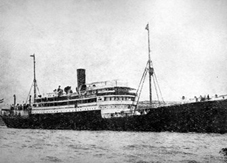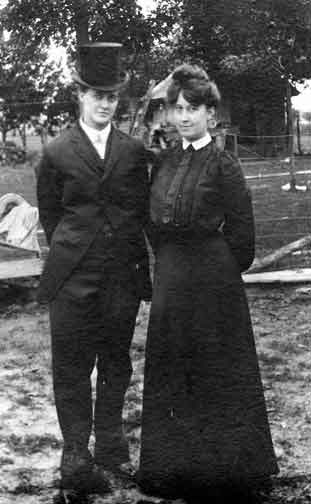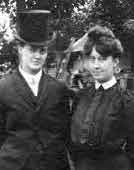Dal: "New York Times" [1/10/1901] [1]
.
|
BOSTON WOMAN POSED
AS MAN WITH A WIFE
Sex of Liner's Passenger
Revealed Through Fatal Sickness.
HAD LIVED TEN YEARS
IN ITALY
An Artist and Had
Won Prizes in Shooting Contests-
Said to Be Daughter
of Col. Hall, U.S.A., Retired.
|
DONNA DI BOSTON SI
SPACCIAVA PER UOMO CON MOGLIE
Il sesso d'un passeggero
svelato dopo malattia mortale
AVEVA VISSUTO DIECI
ANNI IN ITALIA
Era artista e vincitrice
di gare di tiro a segno
Si dice fosse figlia
del colonello in pensione Hall.
|

The strange story of
a woman who preferred to pass for a man was revealed by the death of Miss
Caroline Hall of Boston, a cabin passenger on the steamship Citta di Torino [2]
, which arrived from Naples
and other Mediterranean ports on Sunday. On the passenger list Miss Hall
appeared as "Mr. Charles Winslow Hall," and with her on the ship
was Mrs. Hall, whom she spoke of as "my wife." It was not until "Mr." Hall
was stricken with a mortal illness that the ship's surgeon made the discovery
that the supposed man was a woman. [2]
, which arrived from Naples
and other Mediterranean ports on Sunday. On the passenger list Miss Hall
appeared as "Mr. Charles Winslow Hall," and with her on the ship
was Mrs. Hall, whom she spoke of as "my wife." It was not until "Mr." Hall
was stricken with a mortal illness that the ship's surgeon made the discovery
that the supposed man was a woman. |

La strana storia d'una donna
che preferiva spacciarsi per uomo è stata svelata dalla morte di
Miss Caroline Hall di Boston, passeggera pagante del vapore "Città
di Torino" [2],
che è arrivato domenica da Napoli ed altri porti mediterranei. Sulla
lista dei passeggeri la signorina Hall appariva come "Sig. Charles Winslow
Hall", e con lui sulla nave c'era la signora Hall, di cui parlava come
di "mia moglie". Solo dopo che il "sig." Hall è stato colpito da
una malattia mortale il medico di bordo ha scoperto che il presunto uomo
era una donna. [2],
che è arrivato domenica da Napoli ed altri porti mediterranei. Sulla
lista dei passeggeri la signorina Hall appariva come "Sig. Charles Winslow
Hall", e con lui sulla nave c'era la signora Hall, di cui parlava come
di "mia moglie". Solo dopo che il "sig." Hall è stato colpito da
una malattia mortale il medico di bordo ha scoperto che il presunto uomo
era una donna. |
There
was nothing about "Mr." Hall that would have led anyone to suspect her
sex. She smoked cigars-big strong ones-and drank brandy. She was taken
ill during the first part of the voyage and was forced to remain in her
cabin until death claimed her early yesterday morning, a few hours after
the vessel came into port.
During her illness the
supposed wife waited on her and continued to speak of her as her husband. |
Non
c'era nulla nel "Sig." Hall tale da portare chiunque a sospettare del suo
sesso. Costei fumava sigari - forti e grossi - e beveva brandy. Cadde malata
durante la prima parte del viaggio e fu costretta a rimanere nella sua
cabina finché la morte l'ha reclamata ieri mattina, poche ore dopo
l'arrivo in porto del vascello.
Durante la malattia la sua
supposta moglie ha vegliato su di lei ed ha continuato a parlarne come
del marito. |
The
dead woman was thirty-nine years old and is said to have been the only
daughter of a Col. Hall, a retired army officer living in Boston, who is
reputed[ly] wealthy.
She was of slender build,
medium height, and with a short crop of light hair, cut pompadour. She
dressed well and carried herself with the air of a man. Her voice and gestures
were masculine. |
La
donna deceduta aveva trentanove anni e si dice fosse figlia unica del col.
Hall, un ufficiale in pensione che vive a Boston, che si suppone sia facoltoso.
Era di costituzione snella,
altezza media, e capelli chiari tagliati a spazzola, alla pompadour. Vestiva
bene e si comportava con l'aria di un uomo. La sua voce e i suoi gesti
erano maschili. |
"Mr.
and Mrs. Charles W.Hall" boarded the di Torino when that
vessel was at Genoa, on Sept. 9. The vessel carried seventy-five
cabin passengers.
About one day after the
vessel sailed "Mr." Hall was taken ill and forced to retire to her cabin.
Her companion remained
with the sick woman, who grew steadily worse, and Surgeons Giulio Angrisain [3]
and Nicola Rann had
to be called in. They found the patient very low with consumption, and
in making an examination Dr. Angrisain was astounded to find that "Mr."
Hall was a woman. [3]
and Nicola Rann had
to be called in. They found the patient very low with consumption, and
in making an examination Dr. Angrisain was astounded to find that "Mr."
Hall was a woman. |
"Il
signor Charles W. Hall e signora" si sono imbarcati sulla "di Torino"
durante la sua fermata a Genova, il 9 settembre. La nave portava
settantanove passeggeri paganti.
Circa un giorno dopo che
il vascello era salpato il "signor" Hall cadde ammalato e fu costretto
e ritirarsi nella sua cabina.
La sua compagna è
rimasta con la malata, che è peggiorata costantemente, tanto che
furono chiamati i medici, Giulio Angrisain [3]
e Nicola Rann. Costoro trovarono la paziente molto provata,
e nell'esaminarla il Dr Angrisain fu stupefatto di scoprire che il "sig."
Hall era una donna. [3]
e Nicola Rann. Costoro trovarono la paziente molto provata,
e nell'esaminarla il Dr Angrisain fu stupefatto di scoprire che il "sig."
Hall era una donna. |
She confessed her sex
and begged the ship's surgeons not to make it public. She was informed
that it was necessary to tell the Captain, and the doctors did so, though
the sick woman earnestly requested them not to. None of the passengers,
however, was aware that the sick "man" was a woman.
"Mrs." Hall attended
her companion until the end, and the latter continued to call her "wife." |
Costei confessò il
suo sesso e pregò il medico della nave di non rivelarlo. Le furisposto
che era necessario dirlo al capitano, cosa che il medico fece, nonostante
la malata avesse chiesto apertamente di non farlo. Ciononostante nessuno
dei passeggeri era cosciente del fatto che l'"uomo" ammalato fosse una
donna.
La "signora" Hall ha accudito
la sua compagna fino alla fine, e quest'ultima ha continuato a definirla
sua "moglie". |
| "Mr." Hall is described
by those who became acquainted with "him" on the voyage as being something
of a "jolly fellow," who frequented the smoking saloon, talked sports and
drank plenty of brandy. |
Il "signor" Hall è
stato descritto da coloro che lo conobbero durante il viaggio come una
specie di "compagnone", che frequentava il salone fumatori, parlava di
sport e beveva un sacco di brandy. |
The Coroner's office
was notified of the death and a Coroner's physician last night visited
the ship, and the body was removed to Swinburne Island, where an autopsy
was performed.
In the meantime "Mrs."
Hall had telegraphed to her companion's father in Boston. |
L'ufficio di medicina legale
ha ricevuto notizia della morte e un medico legale la scorsa notte ha visitato
la nave, e il corpo è stato portato a Swinburne Island, dove è
stata effettuata un'autopsia.
Nel frattempo la "signora"
Hall aveva telegrafato al padre della sua compagna, a Boston. |
Early last evening the
following telegram was received on board the vessel:
Boston Highlands, Sept.
30, 12: 30 P.M.
Miss Caroline Hall. Will
be at steamship at 7 o'clock.
ALBERT J. (or G.) Hall.
Albert Hall is said to be
cousin of the dead woman. |
La scorsa sera sul presto,
a bordo della nave è stato ricevuto il seguente telegramma:
Boston Highlands, 30
sett., 12:30.
Spett. Sig.na Caroline
Hall. Sarò al vapore alle 19 in punto.
ALBERT J. o (G.) Hall.
Si dice che Albert Hall sia
il cugino della defunta. |

|
|
La nave "Città
di Torino" su cui avvenne
la morte di Caroline
Hall.
|
| About 6 o'clock,
it was learned, a cab drove up to the steampship pier and a man, who said
he came from Boston, inquired very earnestly if "Caroline Hall" was aboard.
He was sure she had been a passenger, and if she was not on the ship, he
wanted to know what hotel she had gone to. Obtaining no satisfaction, the
man went away, not saying what his name was. |
Alle 18 circa,
a quanto si è saputo, un taxi s'è presentato sul molo della
nave e un uomo, che ha detto di venire da Boston, ha chiesto direttamente
se una "Caroline Hall" fosse a bordo. Era certo che fosse una passeggera,
e se non era a bordo voleva sapere in quale albergo fosse alloggiata. Non
ottenendo soddisfazione, se ne andò, senza dire che nome avesse. |
| All
day long in the saloon of the Torino "Mrs." Hall remained near the
dead, waiting for the latter's relatives to come for the body. She is an
Italian woman of about thirty-five years of age, dark-eyed and with a rather
good-looking face, surmounted by a mass of wavy dark hair. She cannot speak
English and did not seem willing to tell all of the strange story. After
much difficulty the following details were gathered about Caroline Hall
and the strange relationship which existed between "Mr. and Mrs. Hall." |
Per
tutta la giornata nel salone della "Torino" la "signora" Hall è
rimasta vicino alla morta, aspettando che i suoi parenti venissero a prenderne
il corpo. Si tratta d'una donna italiana di circa 35 anni, con occhi neri
e un viso decisamente bello, sormontato da una massa di capelli neri e
ondulati. Non parla inglese e non sembrava avesse voglia di raccontare
la strana storia. Dopo molte difficoltà si sono saputi i seguenti
dettagli a proposito di Caroline Hall e della strana relazione fra "il
signor Hall e signora". |
The
dead woman had resided abroad for over ten years. Most of her time was
spent in Italy, and three years ago she met Giuseppina Boriani at
Milan.
The two women became
fast friends.
About this time Caroline
began to assert her belief that women were not afforded as many opportunities
in the world as men. She was an artist, and in addition was an excellent
rifle shot. It was easier for men to get about, she asserted, and after
brooding for some time over the disadvantages of being a woman she decided
to adopt male attire, and her friend humored her whim. |
La
defunta aveva vissuto all'estero per oltre dieci anni. La maggior parte
del tempo ha vissuto in Italia, e tre anni fa ha incontrato Giuseppina
Boriani a Milano.
Le due donne divennero presto
amiche.
In quel periodo Carolina
cominciò a esprimere la sua convinzione del fatto che alle donne
non erano concesse pari opportunità rispetto agli uomini. Era un'artista,
ed anche un'eccellente tiratore. Era più facile per gli uomini muoversi,
affermò, e dopo aver rimuginato per qualche tempo sugli svantaggi
d'essere donna decise di adottare vesti maschili, e i suoi amici scherzarono
sul suo capriccio. |
| (...) |
(...) |
Some time ago Miss Hall
decided to return to Boston and see her father. He is eighty years old,
and she thought that she might not see him alive unless she went at once.
Her friend she asked
to accompany her, and in order that she might better carry out her assumed
role, Miss Boriani was entered on the ship's manifest as "Mrs. Hall."
Miss Hall would have made
the trip to Boston as "Mr. Hall" had not death overtaken her and revealed
her secret." |
Qualche tempo fa la signorina
Hall decise di tornare a Boston a trovare suo padre. Egli ha ottant'anni,
e pensava che avrebbe potuto non rivederlo più vivo se non fosse
partita subito.
La sua amica le chiese di
accompagnarla, e per farle meglio recitare il ruolo che si era attribuita,
la signorina Boriani fu registrata sul registro della nave come "Signora
Hall".
La signorina Hall avrebbe
concluso il viaggio a Boston come "signor Hall", se la morte non l'avesse
sorpresa, svelando il suo segreto. |

|
|
La foto integrale di
Dollie Starkweather e Mabel Wood. Con ogni probabilità una foto
di Carnevale.
|
Dal: "New York Times" [2/10/1901] [4].
. [4].
.
|
"MR." HALL'S FATHER.
Woman Who Masqneraded
as a Man Was a Daughter
Of J.R. Hall,
a Boston Architect.
|
IL PADRE DEL "SIGNOR"
HALL.
La donna mascherata
da uomo era figlia
di J.R. Hall, architetto
di Boston.
|
| (...) |
(...) |
A
well-known Boston architect, J. R. Hall, is the father of Miss Caroline
Hall, the artist, who died at sea while disguised as a man, and whose body
is now in New York.
Mr. Hall is not, however,
a retired army officer. He has designed several important buildings here,
including one of the theatres. |
Un
noto architetto di Boston, J. R. Hall, è il padre della signorina
Caroline Hall, l'artista, che è morta in mare mentre si spacciava
per un uomo, ed il cui corpo di trova ora a New York.
Il signor Hall non è,
però, un ufficiale dell'esercito in pensione. Egli ha progettato
molti importanti edifici qui, compreso uno dei teatri. |
| An
aunt of the dead woman, at whose home the father lives, he being an invalid,
admitted the identity to-day and said that the news had proved a great
shock to Mr. Hall.
In response to a question,
the aunt, Miss Hall, said: |
Una
zia della defunta, nella cui casa vive l'uomo, essendo invalido, ha ammesso
oggi l'identificazione e ha detto che la notizia è stata uno shock
tremendo per il signor Hall.
In risposta a una domanda,
la zia, la signorina Hall, ha detto: |
| "All
artists are more or less eccentric. I, at least, never knew of the eccentricity
to which you refer." |
"Più
o meno tutti gli artisti sono eccentrici. Per lo meno, io non ho mai saputo
dell'eccentricità a cui vi riferite". |
| The Veloce Line, to which
the Citta di Torino belongs, received a message yesterday afternoon from
a Mr. Hall of Boston, who said he would take charge of the body of the
dead woman. |
Ieri pomeriggo la linea
di navigazione Veloce, a cui appartiene la "Città di Torino", ha
ricevuto un messaggio da un signor Hall di Boston, che ha dichiarato che
si sarebbe preoccupato del corpo della donna morta. |
| The steamship officials
said they did not know what Miss Boriani, Caroline Hall's companion, would
do, but they could say that she would not be a passenger on the Citta di
Torino when it left this port. |
Gli ufficiali della nave
a vapore hanno dichiarato di non sapere cosa avrebbe fatto la signorina
Boriani, la compagna di Caroline Hall, ma potevano escludere che sarebbe
stata passeggera della "Città di Torino" quando avrebbe lasciato
il porto. |
L'autore ringrazia fin d'ora
chi vorrà aiutarlo a trovare immagini e ulteriori dati su persone,
luoghi e fatti descritti in questa pagina, e chi gli segnalerà
eventuali errori in essa contenuti. |
Note
[1]
Il testo, apparso sul "New York Times" dell'1 ottobre 1901, è stato
ricopiato da Jonathan Katz sul sito: Outhistory.org.
La traduzione dall'inglese,
inedita, è mia.
Il caso riguarda una "passing
woman" (donna che passava per uomo) statunitense e quella che appare
chiamente la sua compagna, l'italiana Giuseppina Boriani.
Non possiedo su nessuna
delle due nessun'alcuna informazione, se non quelle riportate nei due articoli
qui ripubblicati.
(per un altro caso simile
italiano si veda qui).
Katz segnala che il caso
diede lo spunto per un articolo di Marian West, edito sul "Munzey's Magazine",
nel 1901: Women who have passed as men, le cui tesi sono riassunte
qui.
[2]
Incredibilmente una pagina internet ("Navi
da viaggio" di Carmelo Antinoro) riporta foto e i dati di questa nave.
Li ricopio, come mera curiosità:
"CITTÁ DI TORINO
- Costruita 1901 da Odero Alessandro e C., Genova, Italia, per la Veloce
Linea. 4.041 tonnellate lorde; lunga 363 piedi; larga 43 piedi. Tre motori
a vapore. Velocità di servizio 12 nodi. 1.536 passeggeri (40 in
seconda classe e 1.496 in terza classe). Due alberi. Linea Genova, Palermo,
Napoli, New York. La nave venne venduta a Sitmar Line, bandiera italiana,
nel 1914 e cambiò il nome Costantinopoli. In disuso dal 1933".
[3]
Il cognome "Angrisain" in italiano
non esiste, "Angrisani" invece sì. Quindi questo sarà un
errore di trascrizione.
"Rann" potrebbe invece essere
errore per "Ranno" o "Ranni", oppure un cognome d'origine tedesca.
[4]
Anche questo estratto d'articolo è stato preso dal "New York Times"
(2 ottobre 1901) da Jonathan Katz, e ripubblicato sul sito: Outhistory.org.
La traduzione dall'inglese, inedita, è sempre mia.
|

